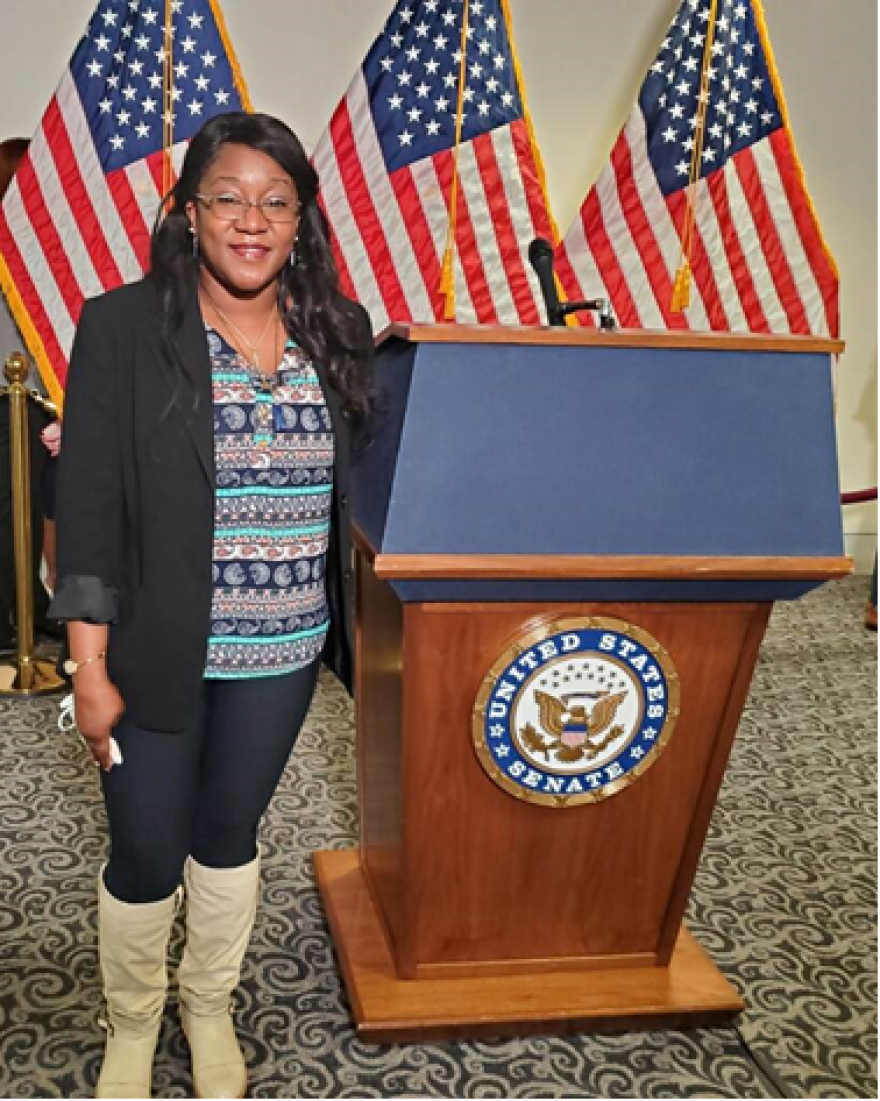The confirmation of Judge Ketanji Brown Jackson to the U.S. Supreme Court last week was a significant moment in American history.
And Vermonter Saudia LaMont got to witness the process firsthand. The racial equity and transformative justice consultant and facilitator was in the room for day three of Jackson’s confirmation hearings in Washington D.C.
She recently described the experience on Vermont Edition.
Vermont Edition co-host Connor Cyrus has again caught up with LaMont to gauge her reaction to Jackson’s confirmation, and what it means for her as a Black woman in the United States. Their conversation below has been edited and condensed for clarity.
Connor Cyrus: The last time we spoke, we were hearing your reflections on being in the room during the confirmation hearings of Ketanji Brown Jackson. Now that she's been confirmed, how are you feeling that you got to witness history?

Saudia LaMont: Blessed and privileged, because not everyone got to go in the room. When you come home and you're around your family and peers and community members, and there's buzz and there's conversations taking place — you got to be present and experience something in a way that other people could only imagine. And that is such an honor and a privilege.
We know that Vermont is one of the whitest states in the country. But that doesn't mean there aren't any BIPOC — that's Black, Indigenous, people of color — living here. Now, when it comes to BIPOC women, what's the significance of being able to see Ketanji Brown Jackson confirmed to the Supreme Court?
Full disclosure, I am not the voice of all BIPOC women. I would like to lead with that, because we are not a monolith. And we all have different lived experiences, and feelings and impressions.
However, my interpretation of what it means for BIPOC women — especially in Vermont being predominantly white, some may question even by intention and design — it means we have a chance. It means things are shifting. It shows how far we've come. Yet the fact that it is now 2022, and we are still shattering ceilings and breaking records — that shows how far we still need to go.
Malcolm X once said that the most disrespected woman in America is the Black woman, the most unprotected woman in America is the Black woman and the most neglected person in America is the Black woman.
Now, to your point about not being a monolith, the experience of Black women in America is all very similar when it comes to the oppression and the discrimination that, especially, powerful Black women face. Does Ketanji Brown Jackson's being in the Supreme Court begin to shift our perception of Black women and how we treat Black women?
In my opinion, yes. Well, first of all, we have to know realize that the things we live and experience are ingrained within our DNA. And so it shifts the narrative because it's something that we haven't seen visibly. It's the visual representation that we need it. She has nine years of experience — she did not just become a judge. This visibility is new. The public recognition is new.
And so what that does, is it paints a different image. Because when you think about Black culture, per se, it is majoritively determined by media presence. It is majoritively determined by what people see and think and the stereotypes they choose to project onto us and associate us with. So if every person can see for a moment, that "Oh, we are so much more than what the media says we are. We are so much more than what society says we are. We are our ancestors' wildest dreams. And we are living truth and making history as we go."
And so it is so important that we have this actual, visual, public government official confirmation and recognition to establish that and help shift those narratives for the general public.
And on this note of inspiration and hope, what are you most hopeful about now that we have Ketanji Brown Jackson on the Supreme Court?
I am more hopeful that BIPOC folks and people of the global majority begin to shed the false narratives and internalized racism that we've experienced. Not everyone, but there's a couple of us. That's why I include myself in that.
When it comes to BIPOC, I think we all have levels of internalized racism that we are all fighting every day. So I think that that's really powerful to point out that it's not just white people that are racist — Black people and BIPOC are dealing with it as well.
Because we're conditioned to, right? And that's why this is so important. We have to shift the narratives. We have to change the language. And I'm so hopeful and it's so inspiring. Because I'm not saying Black people are not great as they are — because we are. But it's really important that the message comes that we are people too. Our lives matter. We should be entitled to the same opportunities and access to resources that our white counterparts have. It's not just us realizing that — it's society and the systems and the structures realizing the roles that they play in keeping those barriers in place.
Have questions, comments or tips? Send us a message or tweet Vermont Edition co-host Connor Cyrus @VPR_Connor.




